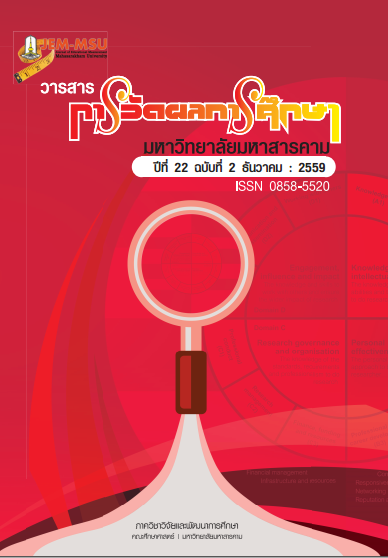Development Learning activity For the Phatomsuksa 6 of Mathematics on ‘Sqaure’ Based on the Constructivism Theory: Mix-Methods
Main Article Content
Abstract
Providing the learning and teaching activity is by the integration with Constructivism
Theory to be the teaching method that makes the knowledge with the old experience and
intelligent structure on the internal attention and motivation, a maths teacher needs to
develop a good learning activities to emphasizing student-centered learning since it can help
learners learn continuously. To help the students make the body of knowledge by
themselves and make the students can remember the knowledge for a long time and apply
the knowledge on their routine really. This study has the objectives. To develop the learning
activity for the Phatomsuksa 6 of Mathematics on ‘Sqaure’ Based on the Constructivism
Theory that has efficiency in rule 75/75. To find the effectiveness index of the efficiency of
the learning activity for the Phatomsuksa 6 of Mathematics on ‘Sqaure’ Based on the
Constructivism Theory. To compare the studying achievement on “Square”to be between
the students with the learning activity by the integration with Constructivism Theory and
normal teaching. To study the contentment in the learning of the students with
Development of Mathematics Learning on ‘Square’ For the Phatomsuksa 6 based on the
Constructivism Theory: Mix-Methods. The procedure is a mixed-method research carrying out
in 2 steps. The first step was the development of maths teaching model based on related
literature and documents from various resources concerning teaching model, observation,
and interview, then the observation and interview were administered with 5 maths teachers
for the development of the learning activity, and syntheses of problem-solving teaching
process for the development of problem-solving lesson plans. The sample for this research
is such as the math teacher about 5 persons. The tools of the research is such as the
question for math teacher. The second step was the pilot of the developed maths with the
samples. The sample for this research is such as the Phatomsuksa 6 at Namonratsongkok
School by Pratomsuka 6 about 20 persons are the testing group and Pratomsuksa about 20
persons are the control group. Each classroom provides mixed ability on 2nd semester year
2557 with Purposive Sampling. The tools of the research are the learning plan with
integration Constructivism Theory“Square”.For Pratomsuksa 6 is about 17 plans to take the
17 hours. The test for math achievement about Square at Pratomsuksa 6 is 4 choices about
30 items that have the easement and difficulty about .35 to .80. There is the discrimination
of each item about .20 to .60 and there is the reliability at all about .74 and rating scale with
5 levels is about 15 items that have the discrimination of each item, rxy, about .38 to .79 and
there is the reliability at all about .84. The statistics for analyzing data are mean, standard
deviation and percentage and Independent Sample t-test.
Research result
1. The learning activity for the Phatomsuksa 6 of Mathematics on ‘Sqaure’ Based
on the Constructivism Theory that has efficiency equals to 86.32/79.33 which were on
established requirement 75/75
2. The efficiency of providing the learning activity for the Phatomsuksa 6 of
Mathematics on ‘Sqaure’ Based on the Constructivism Theory that has equals .6050 or 60.50
3. The students who learn with the learning activity with the Constructivism
Theory have the achievement more than the students learning normal learning activity on
“Square” to be at .05 significances.
4. The students with Pratomsuksa 6 have the contentment to the Development
of Mathematics Learning on ‘Square’ For the Phatomsuksa 6 based on the Constructivism
Theory to at the most satisfied level.
In conclusion, to provide the learning with Constructivism Theory to develop the
understanding of the students that the teachers can apply Constructivism Theory to teach
the learning activity to make the students to have high efficiency and good learning
development and get the achievement in the learning.
Article Details
The content and information contained in the published article in the Journal of Educational Measurement Mahasarakham University represent the opinions and responsibilities of the authors directly. The editorial board of the journal is not necessarily in agreement with or responsible for any of the content.
The articles, data, content, images, etc. that have been published in the Journal of Educational Measurement Mahasarakham University are copyrighted by the journal. If any individual or organization wishes to reproduce or perform any actions involving the entirety or any part of the content, they must obtain written permission from the Journal of Educational Measurement Mahasarakham University.


